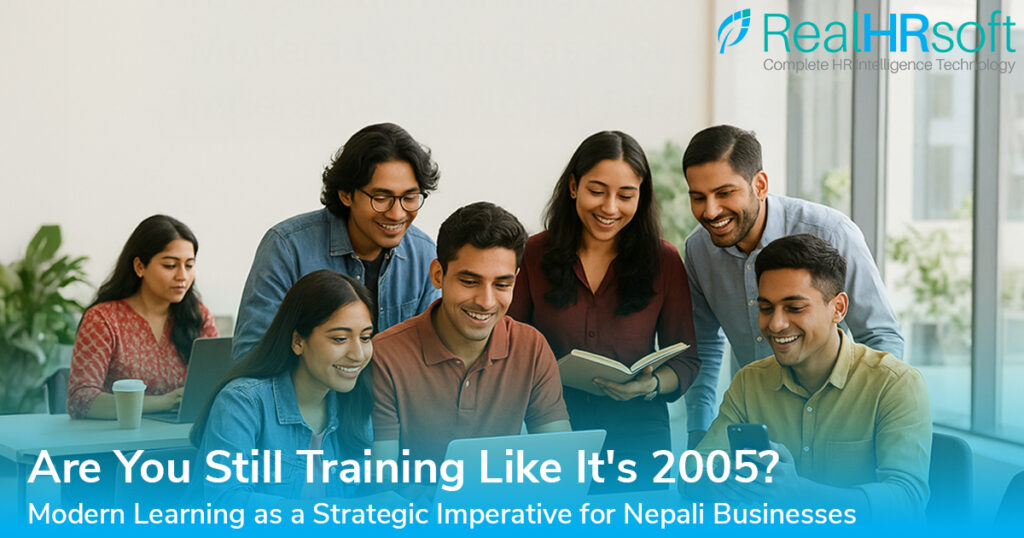Is Your Company’s Training Keeping Pace with Nepal’s Dynamic Future? And is Training Enough?
In many Nepali workplaces, the scene is all too familiar: long lectures, dense PowerPoint slides, and passive participants. This traditional approach, however, is no longer enough to meet the demands of today’s dynamic business environment and evolving workforce expectations. Today’s employees—especially the energetic Gen Z and skilled Millennials—demand more; they’re looking for training that’s practical, interactive, and directly relevant to their real-world challenges.
For Nepali organizations, evolving training methodologies isn’t just about making employees happy; it’s a strategic imperative for sustained growth, enhanced productivity, and gaining a competitive advantage in our rapidly changing market.
But here’s the critical question: Is training enough? While modern training is undeniably a cornerstone of organizational success, it’s crucial to understand that it functions best as part of a larger, integrated HR strategy. It’s a powerful engine, but it needs the right fuel and a well-maintained vehicle to truly drive results. This article will not only explore how to make your training impactful but also position it within the broader framework of strategic HR, recognizing that learning thrives in a supportive ecosystem.
Unlock the Power of Modern Learning: Why Your Business Needs This Now!
Modern training isn’t just a trend; it’s rooted in andragogy – the science of how adults learn best. It emphasizes:
- Learning by doing: Practical application is key.
- Immediate relevance: What’s learned today can be applied tomorrow.
- Respect for learner experience: Valuing the wisdom and insights employees already bring.
- Engagement through interaction: Making learning a dynamic, two-way street.
By embracing these principles, Nepali businesses can unlock a wealth of strategic benefits:
- Increased Productivity and Performance: Engaged, well-trained employees are more productive, directly impacting your bottom line.
- Enhanced Employee Retention and Reduced Turnover: Invest in your people, and they’ll invest in you. This is crucial in Nepal’s competitive talent landscape, where skilled labor can be scarce. Reducing turnover also saves recruitment and onboarding costs.
- Improved Employee Engagement and Morale: Foster a positive learning environment, and watch morale soar, leading to better teamwork and a vibrant organizational culture.
- Agility and Adaptability: In a market that’s always evolving, modern training builds the future-ready skills needed for continuous learning and adaptation.
- Stronger Employer Brand: Be seen as a progressive and desirable employer, attracting top talent in the market.
- Compliance and Risk Mitigation: Ensure adherence to Nepali labor laws and safety regulations, reducing legal and operational risks.
- Innovation and Problem-Solving: Cultivate critical thinking and innovative problem-solving abilities essential for business growth.
Dive Deep into Impactful Methodologies for Nepal
Here’s how you can make training truly transformative in your Nepali workplace:
1. Experiential Learning: The “Garera Herum” Approach (Learning by Doing)
Role plays for customer service or negotiations, simulations for banking or emergency drills, and field visits for practical exposure. This enhances retention and builds real-world problem-solving skills, directly improving on-the-job performance. And is crucial for frontline staff, sales teams, and operational managers.
2. Blended Learning: The “Online-Offline Gyan” (Hybrid Inclusion)
Combining online videos or Google Classroom pre-work with in-person workshops, and using tools like Zoom or Microsoft Teams for follow-up with field staff. This offers flexibility, reduces logistical costs (perfect for organizations with branches across Nepal!), and makes learning more accessible. Consider internet connectivity challenges in rural Nepal; offer offline options. This is Ideal for large, geographically dispersed teams and efficient content delivery.
3. Gamification: Learning is the new game
Points for completing safety modules, badges for participation, and leaderboards for quiz scores on product knowledge. This increases motivation, appeals to younger, tech-savvy employees, and makes learning rewarding and excellent for compliance training and reinforcing soft skills.
4. Peer Learning: “Sathi Sanga Sikne” (Learning with Friends)
Buddy systems for new hires, peer coaching circles for managers, and cross-functional training groups to break silos.It leverages the inherent value Nepali employees place on learning from respected colleagues, promoting knowledge sharing and community. It is essential for onboarding, leadership development, and fostering collaboration.
5. Case-Based & Problem-Based Learning: “Samasya Samadhan” (Problem Solving)
Analyzing local case studies (e.g., a marketing challenge faced by a Nepali brand or a successful community project by a local NGO), and solving workplace dilemmas in groups. This is highly relevant, engages participants in critical thinking, and directly enhances practical problem-solving and crucial for management development and strategic planning teams.
6. Mobile Learning (mLearning): “Hatama Shikshya” (Education in Hand)
Short WhatsApp or Viber training videos, quiz links via SMS, and digital flashcards in Nepali. This helps become accessible across remote regions of Nepal, supports just-in-time learning, and utilizes tools familiar to most employees and optimize content for mobile and consider data costs for employees. This is perfect for distributed sales teams, field technicians, and retail staff.
7. Storytelling as a Learning Tool: “Katha Bata Sikne” (Learning from Stories)
Trainers sharing real-life success/failure stories, and inviting employees to share their own lessons from the field. It leverages Nepal’s strong oral tradition, enhances memory retention, and fosters empathy. It is also excellent for fostering cultural values and promoting ethical conduct.
Your Comprehensive Plan for Transformative Training in Nepal
Implementing these modern methodologies requires a systematic approach, keeping the Nepali context in mind:
Phase 1: Assessment and Strategy (Weeks 1-4)
- Training Needs Analysis (TNA): Identify critical skill gaps aligned with your company’s goals and market trends. Use surveys, interviews, and performance reviews.
- Define SMART Learning Objectives: Clearly state what employees will know and do after training.
- Select Methodologies: Choose methods based on your TNA (e.g., Experiential for sales, Blended for national rollout).
- Budget & Team: Secure budget and form a cross-functional team (HR, L&D, IT, legal) to ensure compliance with Nepali Labor Act 2074.
- Leadership Buy-in: Get senior leadership onboard by highlighting the strategic benefits.
Phase 2: Content Development and Piloting (Weeks 5-12)
- Culturally Relevant Content: Develop materials in Nepali or simple English, using local examples.
- Integrate Methodologies: Design content that naturally uses role-plays, case studies, and game elements.
- “Train the Trainer”: Equip your trainers to be facilitators, not just lecturers.
- Pilot Program: Test with a small group, gather feedback, and refine.
Phase 3: Implementation and Rollout (Weeks 13 onwards)
- Phased Rollout: Implement gradually by department or location for continuous refinement.
- Clear Communication: Explain the benefits of the new training to all employees.
- Logistics & Support: Manage schedules, venues, and provide ongoing technical and guidance support.
- Reinforcement: Encourage immediate application of skills through coaching and peer support. Conduct regular check-ins and refreshers.
- Managerial Support: Train managers to reinforce learning and provide feedback.
Phase 4: Evaluation and Iteration (Ongoing)
- Evaluate (Kirkpatrick’s Model):
- Reaction: How satisfied were participants?
- Learning: What knowledge was gained?
- Behavior: Did on-the-job behavior change?
- Results: What was the impact on business metrics (e.g., sales, errors, customer satisfaction)?
- Continuous Improvement: Use feedback to refine content, methodologies, and delivery.
Nepali Labor Law (Labor Act, 2074 B.S.) Considerations:
- Training Encouraged: The Labor Act, 2074 (2017) encourages employers to provide training and skill development opportunities for their employees.
- Working Hours & Overtime: Ensure training sessions conducted outside regular working hours comply with provisions for overtime pay if applicable, or are mutually agreed upon.
- Safety Training: For industries with specific risks, the Act mandates adequate training on occupational safety and health. Modern experiential learning and simulations are ideal for this.
- Non-discrimination: Training opportunities must be provided without discrimination based on gender, caste, religion, or any other protected characteristic.
- Contractual Obligations: If training is tied to specific employment contracts or bonds (e.g., for specialized skills where the employer bears significant cost), ensure these agreements align with legal provisions regarding notice periods and repayment clauses.
- Record Keeping: Maintain proper records of all training provided, including attendance, content, and participant feedback, as this may be required for compliance or audits.
Final Thoughts: Ignite Nepal’s Future – Beyond Just Training
Stop just “training.” Start strategically empowering your people. Modern learning isn’t a cost; it’s the critical investment for a competitive Nepali enterprise. By embracing dynamic, outcome-driven methodologies, you will:
- Elevate Engagement: Spark passion and commitment across your teams.
- Retain Top Talent: Secure your most valuable assets in a dynamic market.
- Forge Future-Ready Skills: Build the innovation engine your business needs.
- Cultivate a Growth Mindset: Transform your culture into a powerhouse of continuous learning.
The Strategic Imperative: Training provides the fuel, but a supportive organizational ecosystem is the engine. Integrate modern learning with visionary leadership and robust support to unlock its full, transformative power.
Your business grows only as fast as your people learn.
This isn’t just about programs; it’s about a holistic HR vision that sees human capital as your ultimate competitive advantage. Invest strategically, and watch your Nepali enterprise ascend.
Ready to Lead the Future of Work in Nepal?
Partner with us for transformative HR consulting:
info@aayulogic.com | +977-9802-075555





